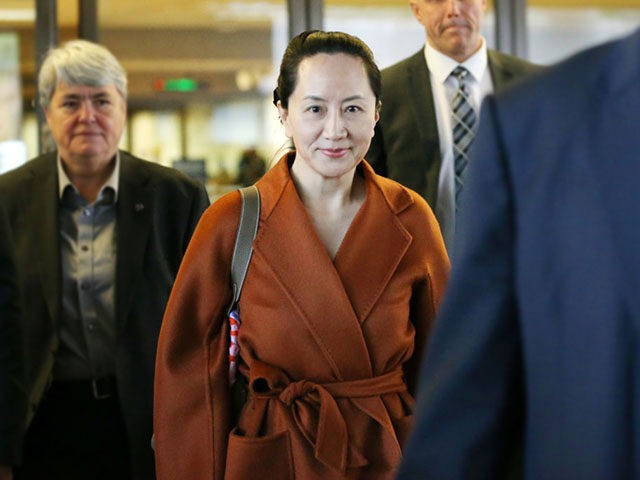Canadian Justice Heather Holmes of the British Columbia Supreme Court on Wednesday ruled against a request by Huawei executive Meng Wanzhou to have her extradition case thrown out.
The United States wants to extradite Meng (pictured) to face charges of fraud and violating U.S. sanctions against Iran.
Meng was arrested by Canadian police at the Vancouver airport in December 2018. She was indicted by the U.S. in January 2019 for using fraudulent means to convince several banks to make transactions that violated U.S. sanctions against Iran.
Her arrest became a major diplomatic flashpoint between the U.S. and China since she is seen as Chinese Communist Party (CCP) royalty and was chief financial officer of Huawei, the Chinese telecom giant that plays a pivotal role in China’s plans to dominate the 5G wireless market around the world. The U.S. has also accused Huawei of stealing technology and posing a security risk to global networking.
Meng’s arrest raised tensions between China and Canada, with the Chinese frequently threatening punishment for Canada if it does not drop the case and let Meng go. The CCP has not been shy about suggesting that the freedom of several Canadians arrested on sketchy charges immediately after Meng was taken into custody is contingent on Canada releasing her.
The New York Times summarized the U.S. case against Meng:
Prosecutors said Ms. Meng lied to representatives of the bank HSBC in 2013 about Huawei’s relationship with Skycom, a company that would clear transactions between Huawei and HSBC in Iran, by saying Skycom was a partner, rather than a subsidiary of Huawei.
They said that misrepresentation amounted to fraud by exposing HSBC to reputational and economic risk in light of the American sanctions.
“Lying to a bank in order to get banking services that creates a risk of economic prejudice is fraud,” said Robert Frater, Canada’s chief general counsel for the Department of Justice, arguing the United States’ case in court earlier this year.
Meng’s attempt to get the case thrown out rested on the argument that Canada no longer maintains the sanctions she violated against Iran, so her actions did not satisfy the requirement of “double criminality” under both U.S. and Canadian law.
Justice Holmes, however, ruled that Meng’s “intentionally false statements” to the banks she is accused of defrauding do merit criminal charges both north and south of the Canadian border.
“Canada’s law of fraud looks beyond international boundaries to encompass all the relevant details that make up the factual matrix, including foreign laws that may give meaning to some of the facts,” she wrote.
Holmes also pointed out that U.S. sanctions against Iran are “not fundamentally contrary to Canadian values in the way that slavery laws would be, for example.”
According to the New York Times, Meng will have one more chance on June 15 to protest that her rights were violated during her arrest in Vancouver. If that appeal also fails, her extradition case can move forward.
Meng remains under house arrest at her $10 million mansion in Vancouver. She spent the weekend posing for photos with friends and Huawei executives on the steps of the Canadian Supreme Court building, suggesting she expected Holmes decision to go her way. The South China Morning Post (SCMP) reported some consternation at Meng’s residence after the decision came down, and quoted her private security guards joking that they expected the U.S. Navy SEALs to swoop in and grab her at any moment.
The SCMP reported the Chinese government reacting with fury to Holmes’ decision, accusing Canada of being an “accomplice” to the United States and helping it perpetrate a “grave political incident.”
The Chinese embassy to Canada issued a belligerent statement using Twitter, a platform the authoritarian regime does not permit its own citizens to access:
In a statement on social media, China’s embassy said: “China hereby expresses strong dissatisfaction and firm opposition to this decision, and has made serious representations with Canada.”
“The United States and Canada, by abusing their bilateral extradition treaty and arbitrarily taking forceful measures against Ms Meng Wanzhou, gravely violated the lawful rights and interests of the said Chinese citizen,” the statement said.
“The purpose of the United States is to bring down Huawei and other Chinese high-tech companies, and Canada has been acting as an accomplice of the United States. The whole case is entirely a grave political incident.”
The statement urged Canada to “immediately release Ms Meng Wanzhou and allow her to return safely to China, and not go further down the wrong path”.
The CCP also reacted angrily to comments that China is holding some Canadians hostage to secure Meng’s release, including diplomat Michael Kovrig, businessman Michael Spavor, and accused drug smuggler Robert Lloyd Schellenberg.
“China urges the Canadian side to respect the rule of law and China’s judicial sovereignty and stop making irresponsible remarks,” said Chinese Foreign Ministry spokesman Zhao Lijian, the official responsible for spreading deranged conspiracy theories this year that the Wuhan coronavirus was an American bio-weapon.
The Canadian government, including Prime Minister Justin Trudeau, insisted on the independence of the Canadian judiciary and called for Holmes’ decision to be respected by all parties.

COMMENTS
Please let us know if you're having issues with commenting.